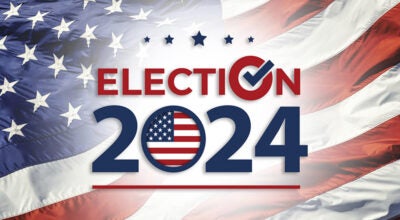Federal judge rules Day of Prayer unconstitutional
Published 8:17 pm Thursday, April 15, 2010
MADISON, Wis. (AP) — A federal judge in Wisconsin ruled the National Day of Prayer unconstitutional Thursday, saying the day amounts to a call for religious action.
U.S. District Judge Barbara Crabb wrote that the government can no more enact laws supporting a day of prayer than it can encourage citizens to fast during Ramadan, attend a synagogue or practice magic.
“In fact, it is because the nature of prayer is so personal and can have such a powerful effect on a community that the government may not use its authority to try to influence an individual’s decision whether and when to pray,” Crabb wrote.
Congress established the day in 1952 and in 1988 set the first Thursday in May as the day for presidents to issue proclamations asking Americans to pray. The Freedom From Religion Foundation, a Madison-based group of atheists and agnostics, filed a lawsuit against the federal government in 2008 arguing the day violated the separation of church and state.
President Barack Obama’s administration has countered that the statute simply acknowledges the role of religion in the United States. Obama issued a proclamation last year but did not hold public events with religious leaders as former President George W. Bush had done.
Crabb wrote that her ruling shouldn’t be considered a bar to any prayer days until all appeals are exhausted. U.S. Justice Department attorneys who represented the federal government in the case were reviewing the ruling Thursday afternoon, agency spokesman Charles Miller said. He declined further comment.
Obama spokesman Matt Lehrich said in an e-mail to The Associated Press the president still plans to issue a proclamation for the next prayer day.
“As he did last year, President Obama intends to recognize a National Day of Prayer,” Lehrich said.
The American Center for Law and Justice, which filed a friend of the court brief supporting the government on behalf of 31 members of Congress, called Crabb’s ruling flawed and promised to back an appeal if one is filed.
“It is unfortunate that this court failed to understand that a day set aside for prayer for the country represents a time-honored tradition that embraces the First Amendment, not violates it,” ACLJ Chief Counsel Jay Sekulow said in a statement.
The Alliance Defense Fund, an Arizona-based group of Christian lawyers, issued a statement saying Crabb’s ruling undermines American tradition dating back to the nation’s birth.
Freedom From Religion Foundation attorney Richard Bolton didn’t immediately return a message seeking comment.
Crabb wrote that her ruling was not a judgment on the value of prayer. She noted government involvement in prayer may be constitutional if the conduct serves a “significant secular purpose” and doesn’t amount to a call for religious action. But the National Day of Prayer crosses that line, she wrote.
“It goes beyond mere ‘acknowledgment’ of religion because its sole purpose is to encourage all citizens to engage in prayer, an inherently religious exercise that serves no secular function in this context,” she wrote. “In this instance, the government has taken sides on a matter that must be left to individual conscience.”
Copyright 2010 The Associated Press.
Summary
Date: 4/15/2010 7:56 PM
Slug: BC-US–Day of Prayer,5th Ld-Writethru
Headline: Federal judge rules Day of Prayer unconstitutional
Source:
Byline: TODD RICHMOND,Associated Press Writer
Copyright Holder: AP
Priority: r (4)
With Photo:
Dateline: MADISON, Wis.
Lead
Editors’ Note: Eds: CORRECTS that the American Center for Law and Justice filed briefs in the case but did not represent defendants and will join an appeal but cannot file one by itself. ADDS photo link.
Word Count: 557
File Name (Transref): B1695 NY197
Editorial Type: Lead
AP Category: a
Format: bx
RECORDID: aed9aa550560433bbd777165853b99b8 ITEMID: p2e35c32daff549fcb22cae3180518466
Edit Mode : Cancel
MADISON, Wis. (AP) — A federal judge in Wisconsin ruled the National Day of Prayer unconstitutional Thursday, saying the day amounts to a call for religious action. U.S. District Judge Barbara Crabb wrote that the government can no more enact laws supporting a day of prayer than it can encourage citizens to fast during Ramadan, attend a synagogue or practice magic. “In fact, it is because the nature of prayer is so personal and can have such a powerful effect on a community that the government may not use its authority to try to influence an individual’s decision whether and when to pray,” Crabb wrote. Congress established the day in 1952 and in 1988 set the first Thursday in May as the day for presidents to issue proclamations asking Americans to pray. The Freedom From Religion Foundation, a Madison-based group of atheists and agnostics, filed a lawsuit against the federal government in 2008 arguing the day violated the separation of church and state. President Barack Obama’s administration has countered that the statute simply acknowledges the role of religion in the United States. Obama issued a proclamation last year but did not hold public events with religious leaders as former President George W. Bush had done. Crabb wrote that her ruling shouldn’t be considered a bar to any prayer days until all appeals are exhausted. U.S. Justice Department attorneys who represented the federal government in the case were reviewing the ruling Thursday afternoon, agency spokesman Charles Miller said. He declined further comment. Obama spokesman Matt Lehrich said in an e-mail to The Associated Press the president still plans to issue a proclamation for the next prayer day. “As he did last year, President Obama intends to recognize a National Day of Prayer,” Lehrich said. The American Center for Law and Justice, which filed a friend of the court brief supporting the government on behalf of 31 members of Congress, called Crabb’s ruling flawed and promised to back an appeal if one is filed. “It is unfortunate that this court failed to understand that a day set aside for prayer for the country represents a time-honored tradition that embraces the First Amendment, not violates it,” ACLJ Chief Counsel Jay Sekulow said in a statement. The Alliance Defense Fund, an Arizona-based group of Christian lawyers, issued a statement saying Crabb’s ruling undermines American tradition dating back to the nation’s birth. Freedom From Religion Foundation attorney Richard Bolton didn’t immediately return a message seeking comment. Crabb wrote that her ruling was not a judgment on the value of prayer. She noted government involvement in prayer may be constitutional if the conduct serves a “significant secular purpose” and doesn’t amount to a call for religious action. But the National Day of Prayer crosses that line, she wrote. “It goes beyond mere ‘acknowledgment’ of religion because its sole purpose is to encourage all citizens to engage in prayer, an inherently religious exercise that serves no secular function in this context,” she wrote. “In this instance, the government has taken sides on a matter that must be left to individual conscience.”




